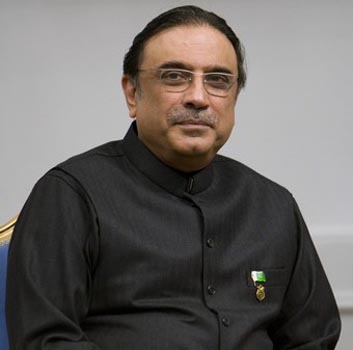Pakistani president approves sharia law for Swat region
 Islamabad - Pakistani President Asif Ali Zardari has approved a regulation to enforce Islamic sharia law in the troubled Swat region, in the hopes of achieving peace with Taliban militants, state media said Tuesday. Zardari signed the controversial document late Monday after the country's lower house of the parliament unanimously adopted a resolution urging him to approve the law for the Malakand Agency comprising eight districts, including Swat.
Islamabad - Pakistani President Asif Ali Zardari has approved a regulation to enforce Islamic sharia law in the troubled Swat region, in the hopes of achieving peace with Taliban militants, state media said Tuesday. Zardari signed the controversial document late Monday after the country's lower house of the parliament unanimously adopted a resolution urging him to approve the law for the Malakand Agency comprising eight districts, including Swat.
Hard-line Muslim cleric Maulana Sufi Mohammad on February 16 brokered a peace agreement between the regional government in the North West Frontier Province and the local Taliban to end months of militant violence in Swat in return for sharia law.
The president's move was in "adherence to the stated intent of all the political forces in this country," the Associated Press of Pakistan reported.
Zardari was previously expected to sign the bill directly, but he referred it to Prime Minister Yousuf Raza Gilani at the weekend, with an advice to debate it in the parliament.
After the parliament passed Monday a resolution calling for imposing sharia law in Swat, Gilani told lawmakers that by supporting the implementation of the agreement, "the National Assembly was respecting the mandate, desire and the will of the provincial government."
Only one political party, the Muttahida Qaumi Movement, abstained due to reservations about the truce, which included withdrawal of government troops sent to Swat valley to quell insurgency spearheaded by radical cleric Mohammad and his son-in-law, Maulana Fazlullah.
Fazullah's spokesman had announced that any lawmaker opposing the sharia law would be committing "apostasy."
Analysts say Zardari could have passed the regulation independently but he involved the political parties to share the blame for possible repercussions.
The government's move to cede authority to Swat militants has sparked concern both at home and abroad.
Western powers believe the decision would embolden the militants, whereas Pakistan's civil society says imposition of strict rules would result in human rights abuses, as seen in the case of controversial public flogging of a girl in Swat recently.
Islamic courts started functioning in Swat last month, but the hardliners were demanding an announcement by Zardari to formally introduce the system of justice. (dpa)